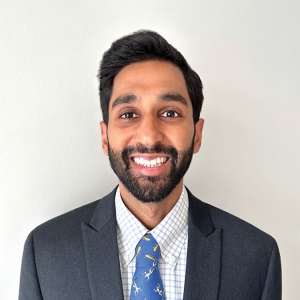
From a very early age, Sant Kumar, MD, (PGY-3, Internal Medicine) was exposed to the world of medicine through his mother’s work as physician in their hometown of San Francisco. Dr. Kumar quickly learned that he was interested in not only the science of medicine, but the need to work across multiple disciplines to solve medical problems and treat patients.
“In internal medicine, you really get to play this role of medical detective where a patient comes in with a chief complaint, and you need to try to piece together and solve what’s going on with the patient,” Dr. Kumar said.
Dr. Kumar and his cat Ferdinand moved from San Francisco to Washington for medical school at Georgetown University, and then residency at MedStar Georgetown University Hospital. Here at MedStar Health, he has put his passion for lifelong learning to good use.
“One of the best parts about internal medicine and medicine as a whole is that you’re always learning – there’s really no finish line,” Dr. Kumar said.
Dr. Kumar pursued Internal Medicine thanks in part to the supportive culture of the department, and leadership’s commitment to helping residents achieve their goals. And Dr. Kumar draws inspiration from his resident colleagues, saying, “I think my peers are all exceptional physicians.”
Dr. Kumar also serves as a resident representative on the MedStar Health Physician Leadership Council, advancing Graduate Medical Education (GME) initiatives on a system level and representing the voice of the more than 1,000 MedStar Health GME residents and fellows. Not only has Dr. Kumar gained valuable insight into the more administrative and policy aspects of medicine, but he’s been able to share that insight with his colleagues and work towards positive change.
“I would like my colleagues to know that their voices do matter,” Dr. Kumar said. “And the more that we can raise awareness about issues or raise awareness about specific things that are impacting us, both positively and negatively, the more likely change is to occur. And the administration does want to know what our experience is and what’s going on.”
As for the future of medicine, Dr. Kumar would like to see greater attention given to creating equity in health care, more resources devoted to addressing mental health and its effect on physical health, and greater incentivization to encourage medical students to pursue primary care and close the growing gap in essential primary care services.

